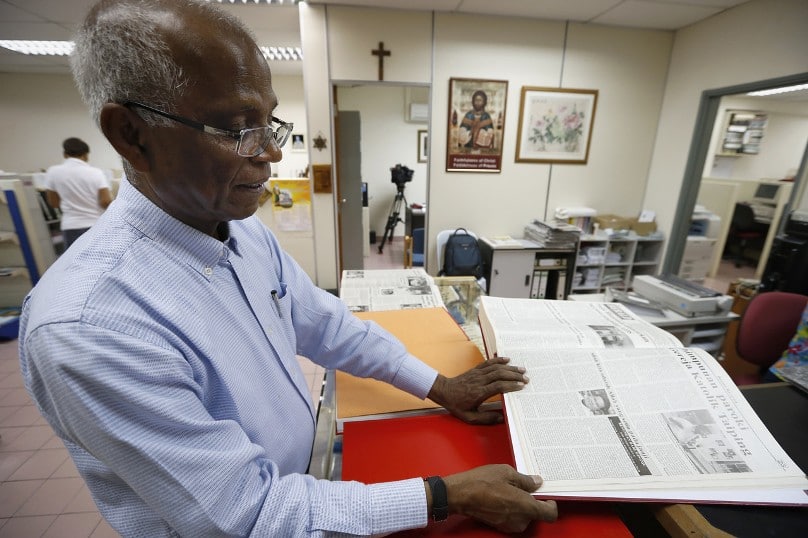The Herald, a Malaysian Catholic newspaper that made international headlines by being banned from using the word “Allah” to refer to God, is finding self-censorship a necessary part of continued survival in a tumultuous political landscape.
Jesuit Fr Lawrence Andrew, who has edited the Herald since its inception in 1994, has good reason to remain cautious, he explained recently to ucanews.com
Current events in Malaysia underscore continuing sensitivities among ethnic and religious groups in the diverse country. As a result, independent media groups are facing increasing political pressure.

The pressure is best illustrated by the three-month publishing ban authorities recently imposed on The Edge Media Group for threatening “public order” by publishing reports on alleged fraud and misappropriation of funds by the state-owned investment company 1Malaysia Development Berhad.
The Financial Times, the Wall Street Journal and other media have all run versions of the story, pointing a finger at Prime Minister Najib Razak.
However, beyond reporting the facts of large anti-government protests in August, the Herald is careful when covering the wider issues of the embattled government. “This is the only paper we have,” Fr Andrew said.
“The Herald has been running for 21 years and if we lose this licence to print, that is something in the Church which goes and it would not be easy to get another licence.”
Choosing what to cover, the priest said, is a matter of weighing whether the paper needs to be more outspoken or whether it should tone down its approach while still carrying an important message.
“It is a question of discerning which is more important: the message to the people we have to carry or be an overly courageous mouthpiece but find ourselves shut down?
That serves no one any good purpose. So we publish what we like, but we are careful. We weigh things,” he explained.
The Herald is no stranger to controversy. Fr Andrew shot to international prominence in 2009 because of a heated public debate over Malaysian Christians’ rights to use the word “Allah” when referring to God in the Malay language.
In 2009, Malaysia’s top court – called the Federal Court – ruled that Malay-speaking Christians had the right to use the word. This decision was followed by unrest with a number of attacks on churches.
The government appealed and the decision was reversed in 2013. The Herald applied for another appeal in 2014, but it was rejected. Since then, the Herald Malay section has observed the ban on using the word “Allah”.
The issue was portrayed internationally as an important constitutional case for the rights of minorities in the country. Christians make up about 10 per cent of Malaysia’s population of 30 million.
Fr Andrew applies his practised caution when it comes to his views on the controversy. “There is no progress unless we initiate a new case, which would be thrown out, so there is no progress,” he said.
Open Doors International, a US-based organisation that advocates for persecuted Christians, said Malaysian Christians face “moderate persecution”. In its 2015 ranking of countries where Christians faced the most persecution, Malaysia was 37th. Fr Andrew takes a nuanced view when asked to judge the level of persecution in the country.
“If you speak to some people they will say: ‘The churches are not attacked. … You can pray, carry a Bible, say what you like in a church. So where is the persecution’?”
Yet the government’s recent enforcement of the ban on the word “Allah” shows that Christians in Malaysia are still vulnerable, the priest said. One factor that may increase the vulnerability is a renewed focus on ethnic and religious divides, spurred by recent political demonstrations.
In late August, large numbers of Malaysians took to the streets as part of an anti-government rally dubbed Bersih 4.0 by its organisers. Ostensibly a demonstration against corruption, protesters called for greater transparency and pushed for Prime Minister Razak’s resignation over the 1Malaysia Development Berhad scandal.
In response, predominantly ethnic Malay government supporters staged their own rally on 16 September. The protest was racially charged, raising fears that it could stoke ethnic divisions. Some demonstrators chanted slogans denouncing the country’s Chinese minority, according to media reports.
For now, Fr Andrew believes religious persecution in Malaysia is a matter of potential concern, even if such troubling hints of discrimination are not yet fully realised.
“Vulnerability exists, and discrimination is there,” he said. “But I believe we are more vulnerable to discrimination than discriminated against.”
